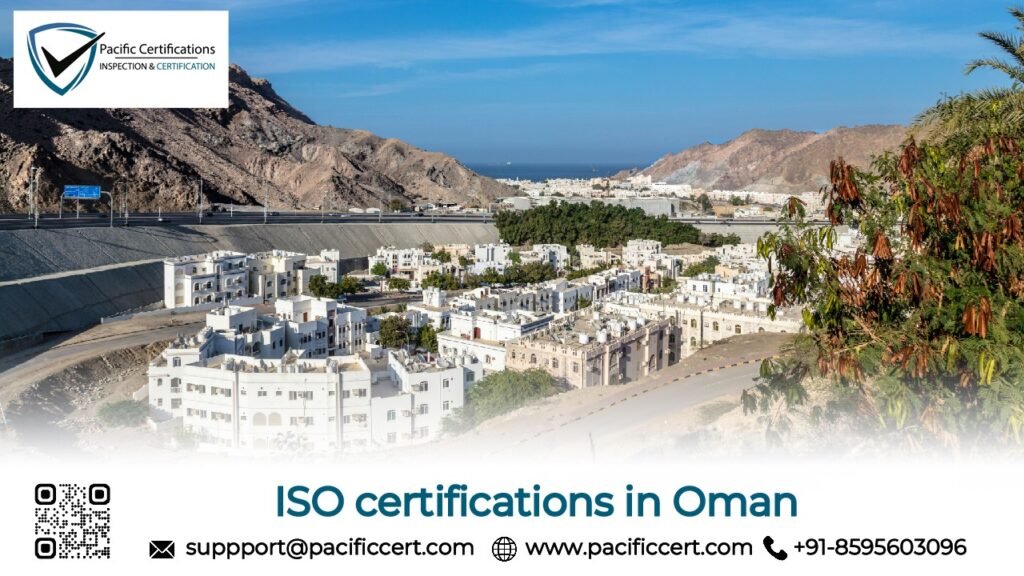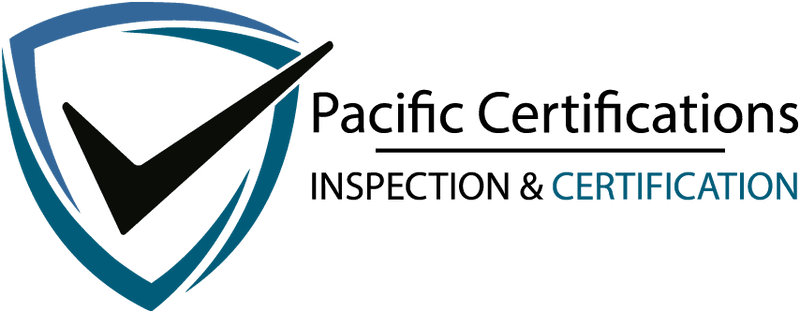
ISO Certifications in Oman and How Pacific Certifications can help
Oman, a rapidly developing country in the Middle East, has been making significant strides in its economic and industrial growth. With a strong focus on diversifying its economy, Oman is increasingly embracing international standards to enhance its global competitiveness. Among these, ISO (International Organization for Standardization) standards play a pivotal role in ensuring that Omani businesses meet international benchmarks for quality, safety, efficiency, and sustainability.
Oman’s government and private sectors have shown a strong commitment to implementing ISO standards across various industries, including oil and gas, construction, healthcare, manufacturing, and tourism. This commitment is reflected in the increasing number of Omani companies seeking ISO certification to demonstrate their compliance with international best practices.
If your business in Oman is seeking ISO certification, reach out to us at support@pacificcert.com or call us at +91-8595603096. We’re here to assist with your certification needs.
Popular ISO Standards in Oman
Several ISO standards have gained popularity in Oman due to their relevance to the country’s key industries and economic goals. The following are some of the most sought-after ISO certifications in Oman:
ISO 9001: Quality Management System
ISO 9001 is one of the most widely recognized ISO standards globally and in Oman. It provides a framework for organizations to establish a robust quality management system (QMS) that ensures consistent delivery of products and services that meet customer and regulatory requirements.
ISO 14001: Environmental Management System
Oman’s commitment to environmental sustainability has led to the widespread adoption of ISO 14001, which sets out the criteria for an environmental management system (EMS). This standard helps organizations in Oman manage their environmental responsibilities in a systematic manner.
ISO 45001: Occupational Health and Safety Management System
ISO 45001 standard provides a framework for managing occupational health and safety (OHS) risks, reducing workplace accidents, and ensuring a safe working environment. Companies in high-risk industries such as construction, oil and gas, and manufacturing are increasingly seeking ISO 45001 certification to demonstrate their commitment to worker safety.
ISO 27001: Information Security Management System
ISO 27001 sets out the requirements for an information security management system (ISMS), helping organizations in Oman protect their sensitive information from cyber threats and data breaches. Financial institutions, government agencies, and IT companies in Oman are among the leading adopters of ISO 27001.
ISO 22000: Food Safety Management System
ISO 22000 standard helps organizations in Oman ensure the safety of their food products throughout the supply chain, from production to consumption. ISO 22000 certification is particularly relevant for food manufacturers, restaurants, and catering services in Oman.
ISO 50001: Energy Management System
This standard provides a framework for organizations to optimize their energy use, reduce energy costs, and minimize their environmental impact. Companies in Oman’s energy-intensive industries, such as oil and gas and manufacturing, are increasingly adopting ISO 50001 to enhance their energy efficiency.
Click here to find out more applicable standards to your industry
Ready to achieve ISO certification in Oman? Contact us at support@pacificcert.com or give us a call at +91-8595603096. Let us help you take the next step towards excellence.
Market News
As of 2024, Oman is witnessing a growing trend toward the adoption of ISO standards across various sectors. According to recent market research, the demand for ISO certifications in Oman has increased by 15% over the past year, driven by the country’s strategic initiatives to diversify its economy and attract foreign investment. The government’s Vision 2040 plan, which aims to transform Oman into a knowledge-based economy, has played a significant role in promoting the adoption of international standards, including ISO.
One of the key trends in 2024 is the increasing focus on sustainability and environmental responsibility. This trend is reflected in the rising popularity of ISO 14001 and ISO 50001 certifications, as organizations in Oman seek to align with global sustainability goals and reduce their carbon footprint. Additionally, the growing emphasis on digital transformation has led to a surge in demand for ISO 27001 certification, as companies prioritize information security in the digital age.
Looking for ISO certification for your Omani business? Get in touch with us today at support@pacificcert.com or call +91-8595603096 to start your certification journey.
Requirements of ISO Standards in Oman
Below is an overview of the key requirements for some of the popular ISO standards in Oman:
ISO 9001: Quality Management System
- Establish a quality management system (QMS) that addresses the organization’s processes and procedures.
- Define quality objectives and implement a plan to achieve them.
- Conduct regular internal audits to ensure the effectiveness of the QMS.
- Implement corrective actions to address non-conformities and improve the QMS.
- Demonstrate a commitment to customer satisfaction and continuous improvement.
ISO 14001: Environmental Management System
- Develop an environmental management system (EMS) that identifies and manages environmental aspects and impacts.
- Establish environmental objectives and targets, and implement plans to achieve them.
- Ensure compliance with applicable environmental laws and regulations.
- Conduct regular environmental audits and reviews to assess the effectiveness of the EMS.
- Implement measures to prevent pollution and minimize environmental impacts.
ISO 45001: Occupational Health and Safety Management System
- Establish an occupational health and safety management system (OHSMS) that addresses workplace hazards and risks.
- Implement controls to eliminate or minimize health and safety risks to workers.
- Conduct regular risk assessments and safety audits to identify and address potential hazards.
- Provide training and awareness programs to ensure employee safety.
- Demonstrate a commitment to continuous improvement in occupational health and safety performance.
ISO 27001: Information Security Management System
- Develop an information security management system (ISMS) that protects the organization’s information assets.
- Implement controls to address information security risks, including access control, encryption, and data backup.
- Conduct regular risk assessments to identify potential threats to information security.
- Implement incident management procedures to respond to information security breaches.
- Ensure compliance with applicable data protection laws and regulations.
ISO 22000: Food Safety Management System
- Establish a food safety management system (FSMS) that addresses food safety hazards and risks throughout the supply chain.
- Implement controls to prevent contamination and ensure the safety of food products.
- Conduct regular food safety audits and inspections to assess the effectiveness of the FSMS.
- Ensure compliance with applicable food safety regulations and standards.
- Provide training and awareness programs to ensure food safety practices are followed.
Ensure your business in Oman meets international standards. Contact us for ISO certification at support@pacificcert.com or +91-8595603096.
Benefits of ISO Standards in Oman
Each ISO standard offers unique benefits tailored to specific areas of an organization’s operations, from quality management to environmental sustainability, occupational health and safety, information security, food safety, and energy management. Below are the key benefits of the following ISO standards:
- ISO 9001 focuses on meeting customer requirements and improving customer satisfaction.
- ISO 9001 helps organizations streamline their processes, reduce inefficiencies, and eliminate waste.
- The ISO 9001 standard requires organizations to identify and address potential risks that could impact product quality or customer satisfaction.
- ISO 9001 promotes a culture of continuous improvement within the organization.
- ISO 14001 provides a framework for organizations to manage their environmental responsibilities systematically.
- ISO 14001 ensures that organizations are aware of and comply with all relevant environmental laws and regulations.
- Organizations with ISO 14001 certification are seen as environmentally responsible and committed to sustainable practices.
- By improving resource efficiency and reducing waste, ISO 14001 can lead to significant cost savings.
- ISO 45001 focuses on creating a safe and healthy working environment by identifying and controlling workplace hazards.
- By systematically managing occupational health and safety (OHS) risks, organizations can significantly reduce the number of workplace incidents.
- ISO 45001 helps organizations stay compliant with local and international health and safety regulations.
- A strong commitment to health and safety can boost employee morale and job satisfaction.
- ISO 27001 provides a comprehensive framework for managing information security risks.
- ISO 27001 helps organizations comply with data protection laws and regulations, such as GDPR (General Data Protection Regulation).
- ISO 22000 ensures that organizations involved in the food supply chain implement a robust food safety management system (FSMS).
- ISO 50001 provides a structured approach to managing energy use, leading to improved energy efficiency across the organization.
- By optimizing energy use and reducing waste, ISO 50001 can lead to significant cost savings.
Each of these ISO standards provides organizations with a powerful tool to improve their operations, manage risks, and enhance their reputation. Whether the focus is on quality, environmental sustainability, occupational health and safety, information security, food safety, or energy management, ISO certifications offer tangible benefits that can help organizations achieve their strategic objectives and succeed in today’s competitive global marketplace.
Need ISO certification in Oman? We can help! Contact us at support@pacificcert.com or call +91-8595603096 to get started.
Who Needs These ISO Certifications?
ISO certifications are relevant to organizations of all sizes and industries in Oman. Below is an overview of who needs these ISO certifications:
ISO 9001: Quality Management System
- Manufacturing companies
- Construction firms
- Service providers
- Healthcare organizations
- Educational institutions
- Government agencies
ISO 14001: Environmental Management System
- Oil and gas companies
- Construction firms
- Manufacturing companies
- Tourism and hospitality providers
- Environmental consultancies
ISO 45001: Occupational Health and Safety Management System
- Construction companies
- Manufacturing firms
- Oil and gas companies
- Transportation and logistics providers
- Mining and quarrying operations
ISO 27001: Information Security Management System
- Financial institutions
- Government agencies
- IT and software companies
- Telecommunications providers
- Healthcare organizations
ISO 22000: Food Safety Management System
- Food and beverage manufacturers
- Restaurants and catering services
- Retailers and supermarkets
- Agricultural producers
- Food logistics and distribution companies
ISO 50001: Energy Management System
- Oil and gas companies
- Manufacturing firms
- Energy utilities
- Large commercial buildings
- Industrial facilities
Certification Process for ISO Standards in Oman
Obtaining ISO certification in Oman involves a series of steps that organizations must follow to ensure compliance with the relevant standard. The certification process is as follows:
Step 1: Initial Assessment
The process begins with an initial assessment of the organization’s current processes and systems to identify gaps and areas for improvement.
Step 2: Documentation Review
The next step involves reviewing the organization’s documentation to ensure it aligns with the requirements of the ISO standard.
Step 3: Internal Audit
Before the certification audit, the organization must conduct an internal audit to evaluate the effectiveness of its management system.
Step 4: Certification Audit
The certification audit is conducted by a third-party certification body, like us, Pacific Certifications. Our auditors will evaluate the organization’s management system against the requirements of the ISO standard to determine whether it meets the necessary criteria for certification.
Step 5: Corrective Actions
If any non-conformities are identified during the certification audit, the organization must take corrective actions to address them.
Step 6: Certification Decision
Once the corrective actions have been implemented and verified, the certification body will make a decision on whether to issue the ISO certificate. If successful, the organization will receive an ISO certificate that is valid for a period of three years.
Step 7: Surveillance Audits
To maintain certification, the organization must undergo regular surveillance audits to ensure continued compliance with the ISO standard.
Step 8: Recertification Audit
At the end of the certification period, the organization must undergo a recertification audit to renew its ISO certification. This audit is similar to the initial certification audit and ensures that the organization’s management system continues to meet the requirements of the ISO standard.
Achieving ISO certification is a powerful way to demonstrate your organization’s commitment to quality, safety, sustainability, and excellence. Whether you are looking to improve your processes, enhance customer satisfaction, or gain a competitive edge, ISO certification can help you achieve your goals.
Pacific Certifications is accredited by ABIS, in case you need support with ISO certification for your Building Pest Control business, please contact us at support@pacificcert.com or +91-8595603096
FAQs: ISO Certifications in Oman
ISO certification is a formal recognition that an organization’s management system meets the requirements of a specific ISO standard. It demonstrates the organization’s commitment to quality, safety, sustainability, or other relevant aspects.
The time required to achieve ISO certification depends on the organization’s readiness and the complexity of its processes. On average, it can take several months to complete the certification process, including the initial assessment, documentation review, internal audit, and certification audit.
Yes, ISO certification is suitable for organizations of all sizes, including small businesses. The certification process is scalable, allowing small businesses to implement the necessary controls and practices to meet the requirements of the relevant ISO standard.
The cost of ISO certification varies depending on the size of the organization, the scope of the certification, and the complexity of the audit. It is recommended to contact a certification body, such as Pacific Certifications, for a tailored quote based on your organization’s specific needs.
ISO certification is typically valid for three years. During this period, the organization must undergo regular surveillance audits to maintain its certification. At the end of the certification period, the organization must undergo a recertification audit to renew its certification.
If your organization fails the certification audit, the certification body will provide a report detailing the non-conformities identified. You will need to take corrective actions to address these issues and undergo a follow-up audit to achieve certification.
Yes, organizations can transfer their ISO certification from another certification body to Pacific Certifications. The transfer process involves a review of your existing certification and a surveillance audit to ensure continued compliance with the ISO standard.
ISO certification is not mandatory in Oman, but it is highly recommended for organizations that want to enhance their credibility, comply with regulations, and improve their overall performance. Some industries and customers may require ISO certification as a condition for doing business.
To prepare for ISO certification, you should start by understanding the requirements of the relevant ISO standard and conducting an internal assessment of your current processes. It may be helpful to seek guidance from a certification body, such as Pacific Certifications, to ensure you are on the right track.
Yes, ISO certification can give your organization a competitive advantage by demonstrating your commitment to quality, safety, and sustainability. It can help you win new customers, enter new markets, and build trust with stakeholders.
Read More at: Blogs by Pacific Certifications








